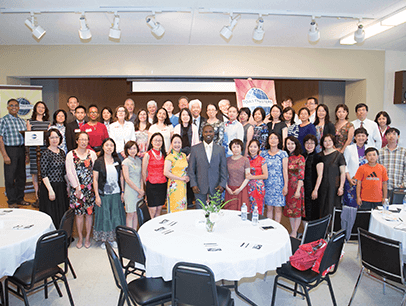
Click play to hear the hosts of The Toastmasters Podcast speak with experienced translator and Toastmaster Gwenydd Jones. In this episode, she shares tips on how to make the most out of attending bilingual meetings.
When I joined Toastmasters Sevilla, I’d been living in Spain for more than 15 years. I grew up in the United Kingdom and completed a bachelor’s degree in French and Spanish at university there, and moved to Sevilla after graduating. To earn a living, I taught English as a foreign language. After meeting the Spanish man who would later become my husband, I went on to earn two master’s degrees in translation and became a freelance translator.
With all that language experience behind me, you’d think I wouldn’t worry about giving speeches in Spanish, right? Wrong. It was a relief when I discovered that Sevilla is a bilingual club and that I’d have a chance to work on my public speaking in English once a month.
I encountered people far braver than me at those bilingual meetings. All members, whatever their level of English, were speaking up, and most of them were struggling. But we were all having a great time, while improving speaking our second (and sometimes third) language.
With the growth of online and hybrid meetings, you can easily practice your second language while connecting with Toastmasters from other countries. I encourage you to face the fear of attending a meeting in your second language. But before you rush off to find a club, here are my top tips to help you get the most out of your visit.
1 Set yourself up for a positive experience.
It’s your job to ensure you get to practice speaking. Help yourself by telling the club that you are planning to visit and that you’re nervous. The members will make an extra effort to welcome you and make you feel at home.
2 Get your motor running.
Take 15 minutes before the session to watch an online video in your second language. This will get your brain warmed up. Arrive early and introduce yourself in your second language to break the ice.
3 Don’t compare yourself to others.
Perhaps someone else is a more proficient speaker than you. Don’t use that as an excuse to stay quiet. Remember that self-shaming about mistakes never stops, even with language proficiency. Every time I speak in Spanish, I berate myself for the tiniest mistakes. I’m getting over this by trying to be more forgiving of myself.
4 Understand that silences aren’t about you.
If you find the members subdued, don’t interpret this as hostility. It’s far more likely that they’re all quietly stressing out about their meeting roles. They may be speaking in their second language and fretting about it, just like you. Break the silence if no one else does.
5 Know that the worst thing already happened.
Silences, funny mistakes, awkward moments—other members have likely already experienced these fears.
In our club, there have been instances of members attempting to answer a Table Topics® question and sitting in silence because the words wouldn’t come. One day, a member finished her speech in English and then, thinking her camera and microphone were off, pressed her fingers to her temples, shook her head, and told herself in Spanish how terribly she’d done. Everyone laughed, reassured her, had fun, and learned together.
6 Commit to participating in Table Topics.
When the meeting starts, use the chat function to ask the Table Topicsmaster if they can give you an easy question. When it’s your turn, keep things simple. Use the Word of the Day for inspiration.
7 Be real about how the other attendees are seeing you.
Rather than assuming everyone thinks your speaking is rubbish, ask yourself this question: What would you think about someone brave enough to do what you’re doing at one of your club meetings? Well, that’s what others are probably thinking about you. It’s admirable to go out of your comfort zone to improve your skills.
And there you have it: preparation, participation, and positivity. If you still need convincing, I can tell you my Spanish has taken a leap forward since I realized the only language barriers were in my head.
Looking to brush up on a foreign language before visiting a club? Listen to this Toastmasters Podcast interview with speaker and entrepreneur Carol Bausor for some extra advice.
Gwenydd Jones is an experienced translator, course creator, copywriter, and member of Toastmasters Sevilla in Sevilla, Spain. She blogs and offers courses for translators at The Translator’s Studio. Her club welcomes any Spanish learners who’d like to visit their hybrid meetings.
Related Articles

Communication
Breaking Language Barriers

Language
The Benefits of Bilingualism

Club Experience



 Previous
Previous

 Previous Article
Previous Article